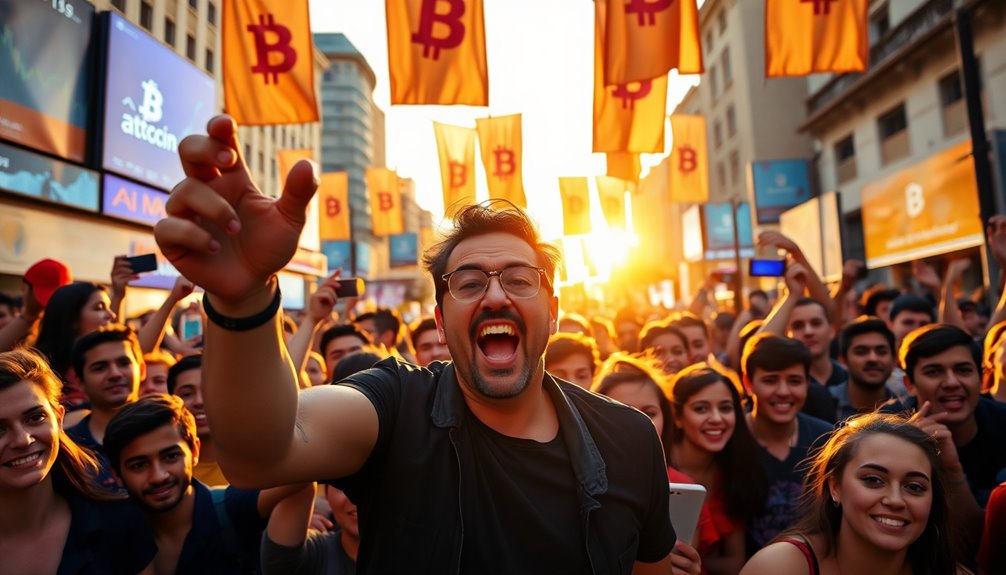The U.S. Treasury pulls back the curtain on a ruthless group of cunning criminals orchestrating Russia's money-laundering empire. Individuals like George Rossi and Ekaterina Zhdanova deploy complex strategies, using shells companies and cryptocurrencies to evade sanctions. They manipulate family and global networks to obscure true fund ownership while moving illicit cash across borders. Recent arrests highlight the extent of their operations, revealing the high stakes of this cat-and-mouse game. As international cooperation tightens, the repercussions on Russia's economy and crime networks become more pronounced. Stay tuned to uncover the deeper layers of this ongoing showdown. The crackdown also sheds light on the broader geopolitical implications, as financial intelligence agencies work tirelessly to untangle these labyrinthine schemes. As investigators dig deeper, Putin’s bitcoin strategy explained by experts reveals a deliberate pivot to cryptocurrencies as a means to circumvent traditional financial systems and maintain economic resilience. This evolving battle underscores the need for cutting-edge tools and unwavering international resolve to dismantle these shadowy networks.
Key Takeaways
- George Rossi leads TGR Group, orchestrating complex money laundering schemes that facilitate illicit transactions for Russian elites and criminal networks.
- Ekaterina Zhdanova heads Smart Group, utilizing digital assets for laundering operations while collaborating with other key players in the criminal underworld.
- Cryptocurrency and OTC brokers enable anonymous transactions, making them attractive tools for money laundering and complicating law enforcement efforts.
- International cooperation has intensified investigations, resulting in significant arrests and asset freezes targeting money laundering operations linked to Russian entities.
- The ongoing economic crisis in Russia exacerbates financial vulnerabilities, increasing the reliance on sophisticated money laundering tactics to circumvent sanctions.
Overview of Sanctions Evasion

Sanctions evasion has become a vital issue as individuals and entities seek ways to circumvent international restrictions imposed on Russia. You might notice that many tactics involve the use of family members and close associates to maintain access and control over funds and assets.
Real estate also plays a significant role, allowing individuals to hold value and benefit from their wealth. Complex ownership structures often obscure the true beneficiaries of financial transactions, making it harder to track illicit activities. Entities owned 50% or more by blocked persons are also targeted in these schemes, complicating enforcement efforts.
Digital assets, especially U.S. dollar-backed stablecoins, provide another layer of evasion by obfuscating financial transactions. Additionally, trade-based money laundering emerges through luxury goods, with industries like luxury watch companies being exploited.
Regions such as Central Asia and the Caucasus are increasingly used as conduits for sanctions evasion, with minimal border checks facilitating the movement of goods. Northern Cyprus has become a hotspot for cryptocurrency transactions, further aiding illicit finance.
As you see, evading sanctions isn't just about financial maneuvers; it's a complex network of strategies that challenge enforcement efforts globally. Understanding these tactics is essential for addressing the ongoing issues surrounding sanctions evasion.
Key Players in Money Laundering

In the world of money laundering, key players operate in the shadows, often leveraging complex networks to facilitate their illicit activities. At the forefront is George Rossi, a Ukraine-born figurehead of the TGR Group, supported by his deputy, Elena Chirkinyan. Together, they orchestrate intricate schemes to obscure the origins of dirty money.
Another significant player is Ekaterina Zhdanova, who leads the Smart Group and has been designated by OFAC for her involvement in laundering funds through digital assets. She collaborates with Khadzi-Murat Dalgatovich Magomedov, coordinating a range of operations that include bulk cash deliveries and cryptocurrency laundering. This operation, which has resulted in 84 arrests, showcases the extensive reach of these networks.
Nikita Vladimirovich Krasnov, a vital partner to Zhdanova, employs a luxury watch company to facilitate trade-based money laundering.
These individuals utilize various methods, from cash to cryptocurrency conversions to prepaid credit card services, to integrate their illicit financial activities into the global market.
Their networks not only serve Russian elites avoiding sanctions but also international drug gangs and cybercriminals. As law enforcement ramps up efforts, understanding these key players and their operations becomes essential in the fight against money laundering.
Cryptocurrency's Role in Crime

Cryptocurrency's rise has created a double-edged sword, enabling both innovation in financial transactions and a new avenue for crime. Criminals have quickly adapted to these digital assets, employing sophisticated methods to launder money. They often use nested services, which exploit smaller exchanges to obscure illicit addresses, making it harder for authorities to trace transactions.
Over-the-counter (OTC) brokers also play a significant role, facilitating large anonymous exchanges, a tactic favored by notorious groups like the Lazarus Group. In 2023, centralized exchanges remained the primary destinations for illicit funds, with illicit addresses sending a staggering $22.2 billion in crypto.
Another common method is smurfing, where large transactions are broken down into smaller, less suspicious ones to evade detection. Bridge protocols have seen a dramatic increase in illicit activity, receiving $743.8 million in crypto from illegal sources in 2023 alone. Despite a decrease in total illicit transactions from $31.5 billion in 2022 to $22.2 billion in 2023, the methods employed by criminals continue to evolve, showing that while crypto can enhance transparency, it also presents significant challenges for law enforcement.
As regulators scramble to devise effective countermeasures, the dynamic nature of cryptocurrency complicates efforts to track and mitigate its use in crime.
Operations and Tactics Used

Criminal enterprises have developed a range of operations and tactics to navigate the complexities of the financial landscape, particularly in evading sanctions. These strategies allow them to conceal their activities while maintaining access to the global financial system.
Here are three key tactics they employ:
- Shell Companies and Banks: They set up shell companies and utilize overseas banks to mask their transactions, creating a facade that obscures the true ownership of funds.
- Digital Assets: They leverage digital assets, like U.S. dollar-backed stablecoins, to move money across borders without drawing attention, allowing for quick and anonymous transfers. The TGR Group has notably exploited these digital assets for sanctions evasion.
- Complex Networks: By creating intricate networks involving multiple intermediaries, they effectively obscure the origin of funds. This complexity makes it harder for authorities to trace illicit activities back to their source.
Through these operations, criminal enterprises not only launder money for sanctioned entities but also provide financial services that facilitate property purchases and support espionage efforts.
Their ability to adapt and innovate keeps them one step ahead of law enforcement, reinforcing the urgency for targeted action against such sophisticated networks.
Recent Arrests and Investigations

You may have heard about the recent arrests linked to the TGR Group, where key figures like George Rossi and Elena Chirkinyan were sanctioned.
International cooperation, especially between the UK's NCA and the US Treasury, has intensified efforts to dismantle these money-laundering networks. The operation, known as Operation Destabilise, has already led to at least 84 arrests, highlighting the extensive scale of the investigation.
As investigations unfold, the implications for global financial security are becoming increasingly apparent.
Key Figures Arrested
How did a network of money launderers operating from Moscow come to light? Recent investigations have disclosed key figures like Ekaterina Zhdanova, who was sanctioned by the U.S. for laundering funds via virtual currency on behalf of Russian elites and the Ryuk ransomware group.
Alongside her, Nikita Vladimirovich Krasnov facilitated bulk cash-to-cryptocurrency conversions. The crackdown has led to several significant arrests: The operation unraveled a sprawling network of illicit financial activities that spanned multiple countries, drawing international attention. Among those implicated were high-profile figures tied to financial scandals, including the fallen Celsius boss fraud admission, which sent shockwaves through the cryptocurrency industry. Authorities revealed that the group exploited weaknesses in anti-money laundering frameworks to further their schemes.
- Fawad Saiedi: Arrested in November 2021 for having $335,000 in cash, he later pleaded guilty and received a sentence of over four years.
- Andrii Dzektsa and Semen Kuksov: Both were arrested in September 2023, linked to Zhdanova's network coordinating cash-for-crypto swaps in Europe. Remarkably, Kuksov is the son of a Russian oil executive.
- Rossi: Currently at large, he allegedly helped Zhdanova's network move illicit cash out of the U.K. through traditional banking systems. This operation has been described as the largest money laundering bust in a decade, exemplifying the scale of the ongoing investigations.
These arrests highlight the extensive operations of a new generation of money laundering, with law enforcement agencies intensifying their efforts against this sprawling criminal enterprise.
International Cooperation Efforts
The recent arrests of key figures linked to Russia's money-laundering operations underscore the growing international cooperation to combat these illicit networks. Countries like the U.S., UK, Canada, and members of the EU have joined forces through the Russian Elites, Proxies, and Oligarchs (REPO) Task Force.
This coalition aims to isolate sanctioned Russian individuals by tracking and restricting their assets. They've frozen tens of billions of dollars and seized high-value properties, effectively denying regime insiders access to essential economic resources.
The U.S. Department of the Treasury's Office of Foreign Assets Control (OFAC) has played a critical role by designating numerous Russian banks and finance officials to prevent exploitation of the international financial system. Additionally, the EU's ten packages of sanctions have targeted Russia's political and military elite, leading to a significant drop in the nation's GDP and trade revenues.
As the Financial Action Task Force considers blacklisting Russia, the ramifications of these cooperative efforts could severely damage its financial standing globally. FATF's decision-making process requires consensus among member countries, highlighting the importance of international collaboration in addressing money laundering.
This multifaceted approach reflects a decisive commitment to curtailing Russia's capabilities to fund its war efforts while dismantling the money-laundering operations that support them.
International Connections and Impact

As you explore the global money-laundering network linked to Russia, you'll find intricate connections that span continents. This web of deceit not only facilitates the movement of illicit funds but also reveals various sanctions evasion strategies employed by those involved. Understanding these dynamics is essential to grasping the broader impact on international finance and security. The U.S. Treasury's actions, including designating Transkapitalbank (TKB), highlight the lengths to which these networks will go to circumvent restrictions and enhance their operations.
Global Money-Laundering Network
Money laundering operates like an intricate web, weaving connections across borders and involving a variety of players from different countries. These networks thrive on a hierarchical structure, where each member specializes in distinct aspects of the laundering process. Their global operations create a complex environment, making it difficult to track illicit funds.
Here's what you need to know about these networks:
- Specialized Roles: Each member plays a significant role, from layering funds through multiple transactions to using real estate for obscuring money origins.
- Foreign Infrastructure: They exploit existing infrastructures, such as foreign banks and companies, to facilitate their operations without raising suspicion.
- Informal Networks: Some networks are less organized, relying on flexible relationships that provide various money laundering services, making detection even harder. Additionally, financial institutions must comply with FATF's standards to effectively combat these networks and mitigate risks associated with high-risk jurisdictions.
The impact of these networks stretches beyond just financial loss. They disrupt monetary policy, deter foreign investment, and inflate property prices, creating instability in economies.
As these criminal geniuses continue to adapt, the global financial system remains vulnerable, highlighting the urgency for effective intervention.
Sanctions Evasion Strategies
Maneuvering the intricate landscape of sanctions evasion, Russian individuals and entities have developed sophisticated strategies to bypass international restrictions. They employ complex ownership structures to obscure connections to assets, using corporate vehicles and third parties to shield their identities.
Family members and close associates often maintain access and control over these assets, while real estate serves as a secure means to hold and benefit from wealth. Additionally, these strategies have reinforced Russia's position as a leading player in the global wheat market, with a 30% share in global exports to further bolster their economic standing.
To counteract the impact of sanctions, Russia has created alternative financial mechanisms like the National Payment System (SPFS) and the National Payment Card System (NSPK), which allow transactions without relying on SWIFT.
New banks have emerged, utilizing intermediaries to adapt to lost access, effectively reducing the influence of European sanctions on Russian financial institutions.
Internationally, these evasion tactics connect Russian financial sectors with global criminal networks, including partnerships with gangs in the U.K. and links to ransomware groups.
By exploiting shortcomings in sanctions enforcement, Russian entities continuously adapt their methods, identifying loopholes in financial restrictions and establishing new pathways for illicit transactions.
This ongoing evolution keeps their money-laundering operations resilient against international scrutiny.
Economic Consequences of Laundering

While the intricate web of money laundering may seem detached from daily life, its economic consequences are deeply felt across Russia. The ongoing war and sanctions have exacerbated the economic strain, leading to a contraction of 2.1% in 2022, and leaving the economy over 5% smaller than expected. This situation contributes to a troubling cycle of fiscal pressure.
Consider these key impacts:
- Declining Living Standards: As the economy shifts towards defense spending, private consumption suffers. This shift is expected to cause long-term declines in living standards, pushing many Russians to leave the country. The focus on war efforts has also diverted crucial resources away from social programs that could improve citizens' quality of life.
- Inflation and Depreciation: The ruble's depreciation is driving inflation, further eroding purchasing power. As prices rise, everyday essentials become increasingly unaffordable for ordinary citizens.
- Global Isolation: Sanctions and disconnection from global financial systems, like SWIFT, hinder Russia's ability to engage in international trade, limiting investment opportunities and stifling economic growth.
These consequences illustrate how money laundering intertwines with macroeconomic challenges, ultimately affecting the lives of everyday Russians.
Disruption of Espionage Funding

Disrupting espionage funding has become a critical focus for international authorities aiming to dismantle the financial networks that support Russian operations. U.K.-led initiatives like Operation Destabilise have made significant strides, leading to 84 arrests and the seizure of £20 million in cash and cryptocurrency.
Targeting groups like TGR Group and Smart Group, these operations exposed the connections between Russian elites, cybercriminals, and UK drug gangs, effectively cutting off essential funds.
Financial Intelligence Units play an important role in this disruption. Russia's Rosfinmonitoring works tirelessly to trace proceeds from crime and terrorist financing, coordinating with various federal bodies to combat money laundering and develop regulatory frameworks.
Sanctions imposed by the U.S. Treasury further tighten the noose around Russian financial activities. By designating over 50 Russian banks and finance officials, the aim is to prevent Russia from tapping into the international financial system for its war efforts.
Additionally, cryptocurrency networks have served as a significant channel for espionage funding, with groups utilizing stablecoins to evade sanctions. This combined international effort is critical in disrupting the financial lifelines that sustain espionage activities.
Future Implications for Sanctions

As global authorities tighten their grip on Russia through sanctions, the future implications of these measures will likely shape both the Russian economy and international relations for years to come.
Despite the current economic resilience, various factors will play a vital role in determining outcomes.
- Economic Adaptation: Russia may continue finding ways to adapt, sourcing lower-quality goods from countries like China and Türkiye, which could undermine the long-term quality and innovation of its economy. Additionally, the real effective appreciation of the ruble since late 2023 may influence import dynamics and economic strategies.
- Financial Vulnerabilities: The financial sector faces significant risks due to high interest rates and foreign exchange market instability. These vulnerabilities might lead to a banking crisis if not addressed.
- International Cooperation: Ongoing international enforcement efforts, like those seen in Operation Destabilise, will continue disrupting illicit financing networks, potentially increasing costs for Russia's money-laundering operations.
Frequently Asked Questions
How Do Money-Laundering Networks Impact Everyday Citizens in the U.S.?
Money-laundering networks impact you directly by distorting economic activities and undermining financial stability.
They lead to higher costs for goods and services, affecting your purchasing power. You might also experience reduced public services due to lower tax revenues, making it harder for your community to thrive.
Additionally, if you're a victim of fraud, it can damage your credit score and financial security, leaving you vulnerable in emergencies and hindering your path to financial stability.
What Measures Can Individuals Take to Protect Themselves From Such Crimes?
To protect yourself from financial crimes, start by monitoring your financial accounts regularly for any unusual activity.
Always verify the identity of anyone requesting your personal information.
Use strong, unique passwords and enable two-factor authentication on your accounts.
Stay informed about common scams and educate yourself on financial crime prevention.
If you spot anything suspicious, report it immediately to your bank or local authorities.
Awareness and vigilance are key to safeguarding your finances.
How Does Cryptocurrency Laundering Differ From Traditional Money Laundering Methods?
Imagine a magician, deftly making money disappear and reappear in unexpected places.
Cryptocurrency laundering differs from traditional methods by relying on anonymity and sophisticated technology. Instead of physical cash, you're dealing with digital coins that dance across decentralized networks.
While traditional laundering hides illicit origins through banks, crypto uses complex transactions and exchanges to obscure trails. This digital sleight of hand makes it harder to track, creating a whole new domain of challenges for regulators.
What Role Do Banks Play in Detecting Money-Laundering Activities?
Banks play an essential role in detecting money-laundering activities. They utilize automated systems to flag suspicious transactions, review them with compliance officers, and conduct detailed investigations.
By monitoring patterns and behaviors, you can identify anomalies that may indicate illicit activities. Additionally, banks collaborate with regulatory bodies and share information with other institutions to strengthen anti-money laundering efforts.
This structured approach helps maintain the integrity of the financial system and combat financial crime effectively.
How Can International Cooperation Enhance the Fight Against Money Laundering?
Imagine a global game of Whack-a-Mole, where every time you smack down a money launderer, two more pop up.
International cooperation's your best bet here. By pooling resources, sharing intelligence, and training together, you can outsmart these financial whizzes.
It's like a superhero team-up, tackling crime across borders. With everyone on the same page, you'll enhance investigations, disrupt networks, and ultimately, make it harder for criminals to hide their dirty cash.
Conclusion
In summary, the fight against Russia's money-laundering empire is far from over. With over $30 billion estimated in illicit funds being funneled through various channels, the stakes are incredibly high. As you explore the intricate web of operations and tactics, remember that every arrest and investigation brings us closer to unraveling this complex network. Staying informed not only empowers you but also plays an essential role in curbing the negative impacts of these criminal enterprises on global economies.









